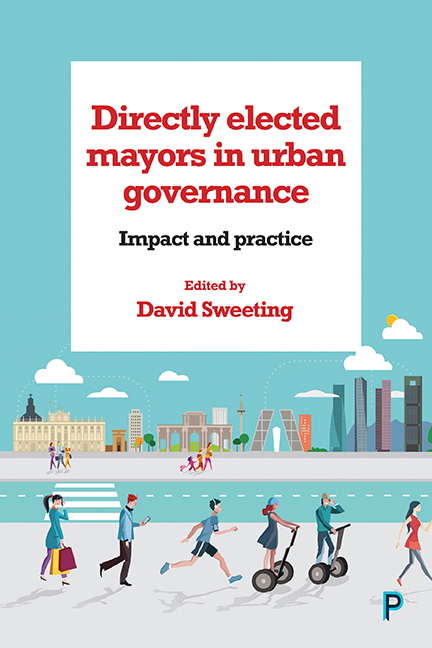fifteen - Conclusions and reflections
Published online by Cambridge University Press: 05 April 2022
Summary
This book has brought together contributions from seven countries on the topic of directly elected mayors. Drawing on the inter-related themes set out in the opening chapter of mayors as institutional and political figures who operate in a context of urban governance, that itself is set in the context of a collaborative and competitive globalised environment, and the material offered in the substantive chapters, I now offer some concluding thoughts that emerge from the works presented here.
One of the key debates to emerge in several chapters is one that cuts across the institutional and political context within which mayoral leadership takes place; that of mayoral power and powers. The dimensions of the debate here surround the extent and importance of formal powers that are endowed on them by the institution within which they operate, the ability of mayors to extend their powers informally, through parties or relationships with other actors in governance, and the checks and limits on mayoral power.
Typically, mayoral governance involves concentrating powers in the figure of the directly elected mayor. However, such concentration is not necessarily the case; as the discussion on US mayors by Svara indicates, there are systems of mayoral governance that do not endow the mayor with considerable formal powers. Rather, they are shared with other figures, such as councillors, and perhaps a council manager. There is variability around mayoral power, both in relation to the formal powers that they have at their disposal, and their ability to extend their powers beyond and outside the confines of the office. The trend presented by the cases in this volume appears to be towards strengthening urban political leadership in terms of formal institutional powers; this appears to be the case in England, New Zealand, Germany and Poland. This is accentuated by the process of direct election, giving greater influence and legitimacy to a political leader.
Nevertheless, there are important caveats to be made around the interplay and intersection of formal and informal powers, and the ability of mayors to take advantage of them. Egner's contribution about directly elected mayors in Germany suggests that formal powers are not especially important in perceptions of mayoral strength, suggesting that informal powers may be more significant to other actors.
- Type
- Chapter
- Information
- Directly Elected Mayors in Urban GovernanceImpact and Practice, pp. 265 - 272Publisher: Bristol University PressPrint publication year: 2017



